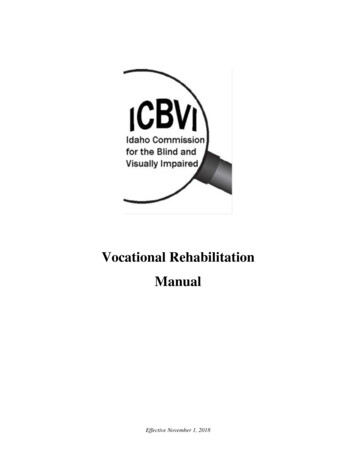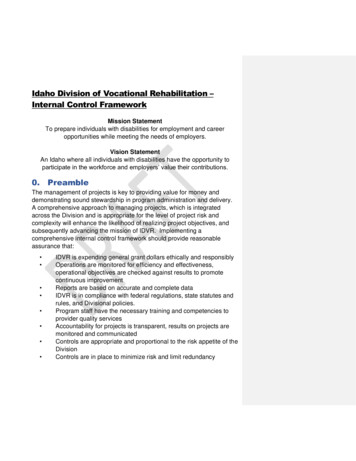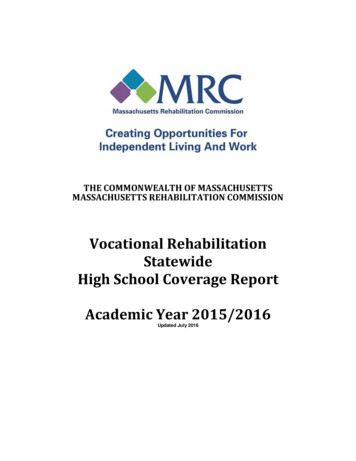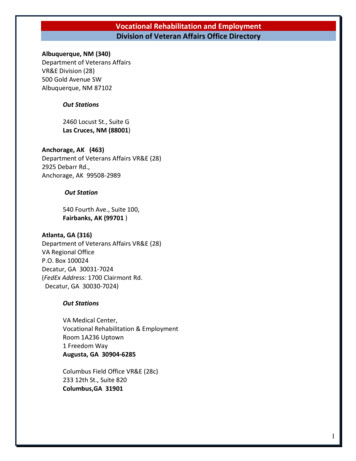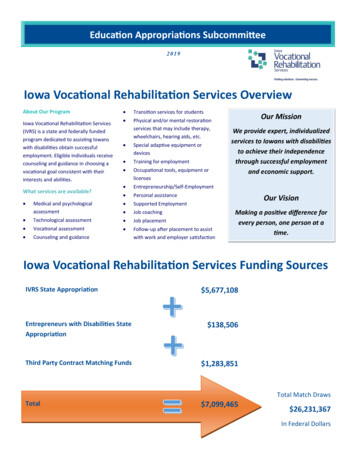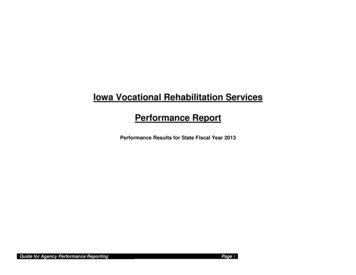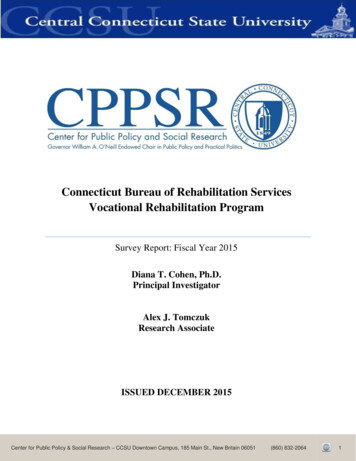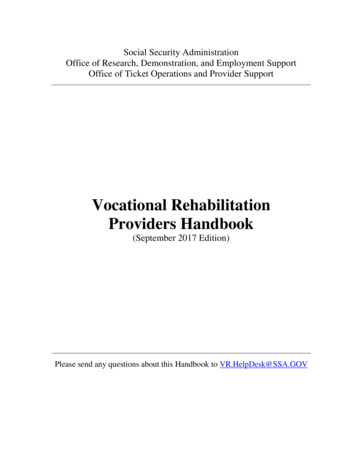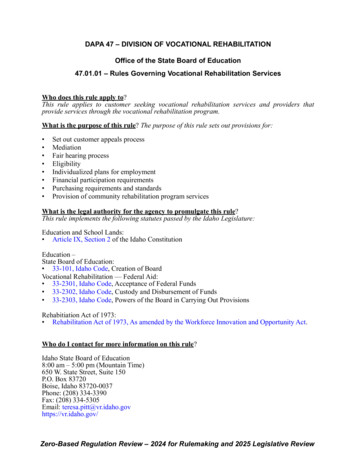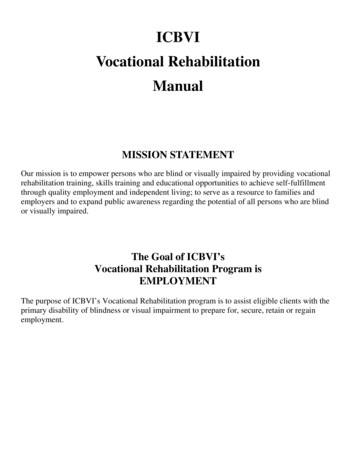
Transcription
ICBVIVocational RehabilitationManualMISSION STATEMENTOur mission is to empower persons who are blind or visually impaired by providing vocationalrehabilitation training, skills training and educational opportunities to achieve self-fulfillmentthrough quality employment and independent living; to serve as a resource to families andemployers and to expand public awareness regarding the potential of all persons who are blindor visually impaired.The Goal of ICBVI’sVocational Rehabilitation Program isEMPLOYMENTThe purpose of ICBVI’s Vocational Rehabilitation program is to assist eligible clients with theprimary disability of blindness or visual impairment to prepare for, secure, retain or regainemployment.
ICBVI VR STATUS FLOW CHARTApplication (02)SSA beneficiarywho intends to goto work (verifySSA benefits)orEligibility WaiverImpairment orDisabilityImpedimentRequires VRServicesAbility to Benefitfor EmploymentTrial Work Experience (06)Extended Evaluation (06)(18 months)Eligibility Determination – 60Close file (30)ComprehensiveAssessment, selectEmployment OutcomeEligible (10)Not Eligible – Close File (08)Determine servicesneeded to get client toemploymentComplete FinancialNeeds AssessmentPlan (IPE) Development – 6 monthsPlan Approval by VRC (12)ServicesInterrupted (24)Services (18)Close File (30)Close File (28)Employment (22) – 90Close File RehabilitatedPost Employment Services (32)7/062
Glossary of ICBVI EAIDVRIEPILIL-OBIPEISDBITJANJSDMDMSDNCSABAids & AppliancesAid to Aged, Blind or DisabledAmericans with Disabilities ActAmerican Council of the BlindAssistive TechnologyAssessment & Training CenterBusiness Enterprise ProgramBenefits Planning Assistance & Outreach (SSA)Client Assistance ProgramClosed Circuit TelevisionCenter for Independent LivingCareer Information SystemComprehensive Advocacy, Inc.Code of Federal RegulationsCertified Rehabilitation CounselorCommunity Rehabilitation ProgramCouncil of State Administrators of Vocational RehabilitationCommunity Supported EmploymentDevelopmental DisabilitiesDisability Determinations ServiceDictionary of Occupational TitlesFederal Fiscal YearHealth Insurance Portability & Accountability ActHelen Keller National CenterIdaho Case Management SystemIdaho Administrative Procedures ActIndividuals with Disabilities Education ActIdaho Division of Vocational RehabilitationIndividual Education PlanIndependent LivingIndependent Living – Older BlindIndividualized Plan for EmploymentIdaho School for the Deaf and BlindInformation TechnologyJob Accommodation NetworkJob Site DevelopmentMacular DegenerationMost Significant DisabilityNational Council of State Administrators for the Blind7/063
DISSITAFITANFTWEVRCWOTCNational Federation of the BlindNational Rehabilitation AssociationOn-the-Job TrainingPlacement & Follow-alongPlan for Achieving Self-SupportPsycho-Social RehabilitationRetinitis PigmentosaRegional Rehabilitation Continuing Education ProgramRehabilitation Services AdministrationRehab Teacher – Home InstructorSignificant DisabilityState Fiscal YearState Independent Living CouncilState Only Program for Prevention of Blindness & Sight RestorationStandard Occupational ClassificationSocial Security AdministrationSocial Security Disability IncomeSupplemental Security IncomeTemporary Assistance for Families in IdahoTemporary Assistance for Needy FamiliesTrial Work ExperienceVocational Rehabilitation CounselorWork Opportunity Tax Credit7/064
ICBVI Client Rights of Appealand the Client Assistance Program (CAP)If the VR Counselor and the client are having problems or disagreements, the first step is todiscuss the issue between them to try to work things out. If this does not result in solving theproblem, the VR Counselor may want to discuss the issue with the Rehab Services Chief.Clients have the right to seek a remedy for any dissatisfaction with decisions made by ICBVIpersonnel that affect the provision of vocational rehabilitation services. Clients may request atimely review of any determinations made by ICBVI.Clients must be notified in writing of these rights at application, at development ofIndividualized Plan for Employment (IPE) and at closure.Clients must be notified that their rights include:1.Informal Dispute Resolution (administrative review) conducted by the RehabServices Chief. (Must be conducted within the 60 day time frame allowed for theImpartial Hearing.)2.Impartial Due Process Hearing (fair hearing) by an Impartial Hearing Officer(IHO) to be held within 60 days of client’s appeal request, and results in a writtendecision to client and agency.3.Mediation is voluntary, conducted by qualified and impartial mediators, and notused to delay or deny client’s right to an Impartial Due Process Hearing.Agreements reached during mediation must be put in writing and discussionoccurring during the mediation process will be kept confidential.4.Availability of assistance from the Client Assistance Program (CAP). CAPbrochure must be given to client.During the appeal process ICBVI will not suspend, reduce or terminate services being providedfor evaluation, plan development or under an IPE.VR Counselor may be involved in any meetings for client appeals.7/065
Client Assistance Program (CAP)The purpose of the Client Assistance Program is:1.To inform and advise clients of available services and benefits under the RehabilitationAct and Amendments. CAP staff can explain how the vocational rehabilitation systemworks and help clients understand their rights and responsibilities in the vocationalrehabilitation process.2.To assist and to advocate for the client in the relationship with ICBVI. CAP can alsosuggest ways for the client and VR Counselor to work more successfully togetherthroughout the vocational rehabilitation process, and assist clients to learn to advocate forthemselves. Advocacy may also include pursing any legal, administrative or otherappropriate remedies to ensure the protection of the client’s rights and to facilitate accessto services funded under the Rehabilitation Act that are directly related to facilitating theemployment of the client.3.To use, to the maximum extent possible, alternative forms of dispute resolution, whichwill include negotiation, facilitation, mediation and fact finding, prior to resorting tolitigation or formal adjudication to resolve a dispute.7/066
ICBVI Client Appeals ProcessFORMAL PROCESSINFORMAL PROCESSFile request for Impartial DueProcess Hearing (fair hearing) toICBVI Administration.File request for Informal DisputeResolution (administrative review)to Rehab Services Chief. Statereason for review.Impartial Due Process Hearing(fair hearing) conducted byImpartial Hearing Officer within 60days of request.Informal Dispute Resolution(administrative review) conductedby Rehab Services Chief within 60day time period.Mediation conducted byimpartial Mediator within 60day time period.IHO chosen from State approvedlist IHO informs client of time &date.Rehab Services Chief informsclient of time and date.Mediator chosen from list ofqualified mediators. Mediatorinforms all parties of time and date.Rehab Services Chief makesdecision on Informal DisputeResolution (administrativereview). Responds in writing toclient.Written MediationAgreementClient may request ImpartialDue Process Hearing (fairhearing) or Mediation if,dissatisfied with InformalDispute Resolution(administrative review).Client may request an InformalDispute Resolution(administrative review) orImpartial Due Process Hearing(fair hearing) if dissatisfied withMediation.Decision Final02/07File request for Mediation toRehab Services Chief. Statereason for mediation.
ICBVI Confidentiality of Client Information1. Confidentiality of Client RecordsAll personal information concerning clients is confidential. The information is used onlyfor purposes directly connected to the administration of the ICBVI program, and may notbe released without the informed, written consent of the client. There are someexceptions required by law.2. Storage of Confidential Client InformationConfidential client information shall be stored in such a manner so that it is not casuallyavailable for public scrutiny during official work hours. It shall be stored under lock andkey when not being directly used or during non-working hours.This includes client information on your computer screen. If you are not using yourcomputer, exit the ICMS program. Log out when you will be gone from your office.3. Release of Confidential Client InformationAny information in the client’s file may be released to the client, in a timely manner,if requested in writing by the client. (Use Release of Information form).There are three exceptions to the above:a) Medical, psychological, or other information that ICBVI determines may be harmful tothe individual may not be released directly to the individual, but must be providedthrough a third party, such as a representative, physician or licensed psychologist.b) Information obtained from Social Security Administration, including DisabilityDetermination Services may not be released.c) Information obtained from the Veterans Administration may not be released.4. Release to other programs or agenciesClient’s personal information will only be released to other programs or agencies withclient’s written consent, and only for the purpose of the client’s vocational rehabilitation.Information from Social Security Administration, including Disability Determination02/07
Services, or Veterans Administration may not be released.5. Exceptions to Release of Information RequirementsPrior written approval will not be required for the release of personal data in the followingcircumstances:a) Release for audit, evaluation or research.Information will only be released for purposes directly connected with theadministration of the ICBVI vocational rehabilitation program or for purposes thatwould significantly improve the quality of life for people with disabilities.Confidentiality would be safe guarded.b) Release required by law:1)ICBVI shall release personal information in response to investigations inconnection with law enforcement, fraud, or abuse, unless expressly prohibitedby Federal or State laws or regulations, and in response to a court subpoena orjudicial order.2)ICBVI may also release personal information in order to protect the client orothers when the client poses a threat to the safety of self or others.6. Amending Information in Client FileIf a client believes that information in the file is inaccurate or misleading, the client mayrequest that ICBVI amend the information. If the information is not amended, the requestfor an amendment must be documented in the file.7. Retention and Destruction of filesFiles will be maintained for five years after case closure. All data with personalidentifying client information shall be destroyed by shredding, burning or other disposalmethods to ensure confidentiality.8. It is ICBVI’s policy that we respect the confidentiality of our clients. VR counselorsshould not take applications or work in the rehabilitation process with close friends orrelatives. When this situation arises, notify the Rehab Services Chief and arrangementswill be made to have another VR counselor work with the client.02/07
ICBVI Disability CodesThe disability code will now be a combination of the impairment code and cause/sourcecode. The first two digits designate the impairment (sensory, physical or mental), and the lasttwo digits indicate the cause or source of the impairment.Codes for Impairments00No impairmentSENSORY/COMMUNICATIVE IMPAIRMENTS:01Blindness02Other Visual Impairments03Deafness, Primary Communication Visual04Deafness, Primary Communication Auditory05Hearing Loss, Primary Communication Visual06Hearing Loss, Primary Communication Auditory07Other Hearing Impairments (Tinnitus, Meniere’s Disease, hyperacusis, etc.)08Deaf-Blindness09Communicative Impairments (expressive/receptive)PHYSICAL IMPAIRMENTS:10Mobility Orthopedic/Neurological Impairments11Manipulation/Dexterity Orthopedic/Neurological Impairments12Both mobility and Manipulation/Dexterity Orthopedic/Neurological Impairments13Other Orthopedic Impairments (e.g., limited range of motion)14Respiratory Impairments15General Physical Debilitation (fatigue, weakness, pain, etc.)16Other Physical Impairments (not listed above)MENTAL IMPAIRMENTS:17Cognitive Impairments (impairments involving learning, thinking, processinginformation and concentration)18Psychosocial Impairments (interpersonal and behavioral impairments, difficultycoping)19Other Mental Impairments02/07
CODES FOR CAUSES/SOURCES OF IMPAIRMENTS:00Cause Unknown01Accident/Injury (other than TBI or SCI)02Alcohol Abuse or Dependence03Amputations04Anxiety Disorders05Arthritis and Rheumatism06Asthma and other Allergies07Attention-Deficit Hyperactivity Disorder (ADHD)08Autism09Blood Disorders10Cancer11Cardiac and other Conditions of the Circulatory System12Cerebral Palsy13Congenital Condition of Birth Injury14Cystic Fibrosis15Depressive and other Mood Disorders (includes Bipolar)16Diabetes Mellitus17Digestive18Drug Abuse or Dependence (other than alcohol)19Eating Disorders (e.g., anorexia, bulimia, or compulsive overeating)20End-Stage Renal Disease and other Genitourinary System Disorders21Epilepsy22HIV and AIDS23Immune Deficiencies excluding HIV/AIDS24Mental Illness (not listed elsewhere)25Mental Retardation26Multiple Sclerosis27Muscular Dystrophy’28Parkinson’s Disease and other Neurological Disorders29Personality Disorders30Physical Disorders/Conditions (not listed elsewhere)31Polio32Respiratory Disorders other than Cystic Fibrosis or Asthma33Schizophrenia and other Psychotic Disorders34Specific Learning Disabilities35Spinal Cord Injury (SCI)36Stroke37Traumatic Brain Injury (TBI)02/07
Clarification of Disability Codes for Mental ImpairmentsCodes for ImpairmentsCauses/Sources of Impairments17 Cognitive Impairments:25 Mental RetardationSpecific Learning Disabilities18 Psychosocial Impairments:04 Anxiety Disorders08 Autism (includes Asperger’s Syndrome)15 Depressive and other Mood Disorders (includingBipolar Disorders)33 Schizophrenia and other Psychotic Disorders19 Other Mental Impairments:02 Alcohol Abuse or Dependence07 Attention Deficit Hyperactivity Disorder (ADHD)19 Drug Abuse or Dependence20 Mental Illness (not listed elsewhere)29 Personality Disorders02/07
ICBVI Application (Status 02)Any individual with a disability of blindness or visual impairment that prevents him/her fromworking may apply for vocational rehabilitation services at ICBVI. Citizenship is not arequirement for ICBVI vocational rehabilitation assistance, but the individual must havelegal resident status, be able to complete the Employment Eligibility Verification (I-9) and bepresent in the state.To apply for VR services, client must:1.Meet with VR Counselor, complete and sign the Application.2.Assist in providing medical and psychological reports to substantiate disability andfunctional limitations. If an SSA beneficiary, assist in providing evidence of receipt ofSSA benefits.3.Be available to complete assessment process.4.Be an active and full partner in the vocational rehabilitation process.5.Intend to achieve an employment outcome.VR Counselor must:1.Establish rapport with clients.2.Provide vocational guidance and counseling to client starting at application andcontinuing until case closure.3.Explain the purpose and goal of vocational rehabilitation. Be sure clients know thegoal of vocational rehabilitation is employment from the very beginning of thevocational rehabilitation-client relationship.4.Discuss with your clients, the responsibilities they have in the vocationalrehabilitation process and the expectation that full participation will be requiredof them. Clients need to understand that they must keep appointments, work hard ontheir own behalf as much as they are able to, complete all tasks assigned by the VRCounselor, be partners in the planning process, maintain regular contact with VRCounselor and discuss any issues that may affect their progress.02/07
A positive and mutually respectful ICBVI-client relationship is essential for the client toprogress with ICBVI assistance to successful employment.5.Explain and complete Application forms: Application for Services Client Rights & Responsibilities Payment Policy for Services Release of Information Give client a Client Assistance Program (CAP) brochure, and explain thepurpose of CAP.6.Request verification of Social Security Administration (SSA) benefits. This should bedone on the date of Application.Assess need for Rehabilitation Technology Services, ifand when necessary.7.If SSA beneficiary, discuss the Benefits Planning Assistance & Outreach BPOAProgram/SSA Work Incentives Program, Ticket to Work and ICBVI’s goal to returnclients to employment and get them off SSA benefits, when possible.8.Inform each client about their rights and responsibilities to exercise informed choice indecisions related to the provision of assessment services.9.Use existing and current medical and/or psychological data, including informationfrom other programs and providers, particularly information used by education officialsand the Social Security Administration and information provided by the client and theclient’s family. Medical and/or psychological reports from closed files can be used ifdata is still current. If existing data does not describe the client’s current functioning orif no medical and/or psychological reports are available, then ICBVI can purchase anyevaluations necessary to determine eligibility.Current information will depend on the nature and degree of the client’s disability.If the disability is stable and relatively unchanging, then medical/psychologicalinformation that is older (several years) can be used (e.g. total blindness, cerebralpalsy). If the disability is changeable, then more recent information (last few months)needs to be used (e.g. vision loss, diabetes mellitus, multiple sclerosis, mental illness,etc.).Medical reports can be utilized without the medical doctor’s signature if the report ison letterhead or comes directly from the office and the doctor had direct supervisoryoversight of the practitioner.02/07
Medical reports on vision impairments can be used from optometrists orophthalmologists.Psychological/psychiatric reports can be utilized without the licensed psychologist orpsychiatrist’s signature if the report is on letterhead or the practitioner was directlysupervised by the licensed psychologist or psychiatrist.For students with disabilities who will be transitioning from the school system to aworking environment, the school psychologist can be used for diagnosis ofdevelopmental and learning disabilities. The school psychologist’s signature does notneed to be on the report, if it is on school letterhead or included in the IEP.For Mental Health clients being treated by the public Mental Health offices of theDepartment of Health & Welfare, the Mental Health Clinician, or other professionalstaff, can be used for diagnosis of mental illness disability as long as they work underthe supervision of a licensed psychologist or psychiatrist. A signature is not needed ifthe report is on Mental Health letterhead.For clients with substance abuse, diagnostic reports can be used from licensedpsychologists, medical doctors or certified drug and alcohol counselors.For clients with hearing impairments, diagnostics reports can be used from medicaldoctors or ENT specialists, clinical audiologists, but not from hearing aid dealers.The Medical Consultant can always be used to confirm diagnoses of disability andfunctional limitations.Place forms and reports in a case file and then reference them in the RCR. The RCRneeds to be concise but effectively chronicle th
Vocational Rehabilitation Program is . EMPLOYMENT . The purpose of ICBVI’s Vocational Rehabilitation program is to assist eligible clients with the primary disability of blindness or visual impair
